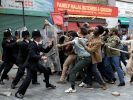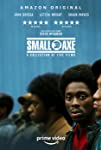Eye For Film >> Movies >> Alex Wheatle (2020) Film Review
Alex Wheatle
Reviewed by: Anne-Katrin Titze

Steve McQueen’s Alex Wheatle, co-written with Alastair Siddons, shot by Shabier Kirchner with costumes by Jacqueline Durran is episode 4 of his Small Axe anthology (a Lovers Rock Drive-In opened the New York Film Festival, and Mangrove with Red, White And Blue screened in the Main Slate). The title character ((Sheyi Cole) is brought to a prison cell where a foul smell awaits him, courtesy of his bunkmate Simeon (Robbie Gee). Remember how Peter Morgan in the very first scene of the first episode of season one of The Crown, directed by Stephen Daldry, repels us with the blood-spitting King George VI (Jared Harris), only to pull us in even more soon after? McQueen is equally good at provoking visceral reactions from the audience. Franco Rosso’s 1980 Babylon, starring Brinsley Forde with music by Dennis Bovell (producer and writer of Janet Kay’s Silly Games featured in Lovers Rock) may come to mind for later scenes.
In flashback, a mean-spirited white woman beats and chastises 8-year-old Alex Wheatle (Asad-Shareef Muhammad), who we learn was abandoned by his mother at birth. At the foster home he wets his bed and as punishment gets the towel shoved in his mouth and called a “horrible nasty little boy.” Back in prison, his cellmate Simeon, realising how traumatised Alex (Cole) is, tries to calm him after a distraught tussle and asks the central question: “Listen man, you are here. What’s your story?”

Another flashback shows Alex in school, discovering reggae music, a white pupil makes monkey gestures. It is Alex, when he confronts the student, who is hustled outside the classroom, put in a straight jacket and violently thrown down by two men onto the floor of the gym. McQueen pertinently zooms in slowly and stays for a long time on the face of the bound boy, lying helpless and hopeless.
Alex being transported sitting in the back seat of a car hears soothing music start a radio program, called Desert Island Discs, with guest Roald Dahl, who explains that music means a great deal to him. He recounts how he hoped that by putting on a Beethoven quartet, “the greatness would rub off”. The soundtrack transitions into a reggae vocal and dub track as the ride continues into Brixton where Alex (Cole) is dropped off at his next place of residence, one room, where he meets Dennis (Jonathan Jules) and Dawn (Fumilayo Brown-Olateju).
Dennis, who wears a black turtleneck, a tweed coat, and a Basque cap, becomes Alex’s questionable mentor and guide through the streets and characters of his new neighbourhood. At Dennis’s suggestion Alex goes with him to a barber shop to get a blowout, Alex insists he is “not African, but from Surrey” and receives his first lesson about Babylon, which is not to be found “on the map.” The orientation or initiation continues with an acquisition of new shoes, blowing smoke through cupped hands, and training how to “walk like a Jedi.” But it is the music that makes all the difference when he enters the Soferno B Record Shack.
A Christmas invitation from Dennis to Alex unfolds in a masterfully conveyed rhythm of unease. “I don’t like Christmas,” the orphan starts out in response to the offer. Of course, how could he? Dropped on a sofa among the large Jamaican family of his friend, with children playing and the patterns of the wallpaper and the chairs swirling in his head, he is handed a baby to hold and then a big plate of food which he scarfs down in record speed.
The scene that follows is McQueen at his strongest and truest. Foregoing any stereotypical holiday miracles of togetherness, he shows Alex using his asthma inhaler, crying, alone, walking down the grey, cold street as we can still hear the laughter of the party he just left. Self-pity, relief, alienation, a sense of home and a sense of escape all mend in this moment.
Music and police brutality dominate the next chapter of Alex’s life as he starts to build his own sound system, Crucial Rocker, with his friend Valentine Golding (Elliot Edusah). In order to get the coin for it, he has to see Cutlass Rankin (Johann Myers of James Gray’s The Lost City Of Z), is searched at the door, and has to fully undress in the basement for a check to see if he is not wired. Alex will tell Simeon “for me it was always about the music”.
Police violence is everywhere on the streets. Alex sees his pal Badger (Khali Best) beaten up and randomly taken in. We see blood on the outside of the van and hear screams from inside. On the queue outside the Bali Hai Club, Alex has a confrontation with a police officer and gets shoved into a van, where he is left till the next morning tied down, the way he was as a little boy. Next, he is dropped off somewhere in a park, from where he has to find his way back. We see him through the police car’s rearview mirror and hear the invisible policeman condescendingly joke “They never learn, do they. They never learn.” It is the exact same tone Holocaust denier David Irving is caught on camera using in Petra Epperlein and Michael Tucker’s The Meaning Of Hitler.
Photos from the New Cross Massacre of January 1981, where a building was set on fire during a house dance party, and the subsequent protest are the focus of the film’s third act. We hear a poetic plea for justice (Linton Kwesi Johnson’s New Crass Massakah, produced by Dennis Bovell) in voice-over as multiple black and white still images from the scenes come across the frame. Thirteen young people dead, 30 more injured, and no arrests (Dea Kulumbegashvili’s Beginning shows what happens when the police are prejudiced against a community), make Alex conclude that “we’re in the middle of a war.” The Black People’s Day of Action protest is restaged. Cinematographer Shabier Kirchner miraculously positions us in the middle of the chaotic and dangerous atmosphere during the protest and is equally good at capturing intimate moments of anguish.
Alex composes a song, lying on his bed, singing to himself “we can’t take no more of this suffering, so we riot in Brixton”. At his Crucial Rocker sound system event inside a private living room he performs his Uprising song to an appreciative and friendly gathering of admirers. The next morning while he is asleep in his bed the police burst into his room on the second floor dragging him down the stairs and out of the house in his underwear.
So we come full circle to the prison cell to hear Simeon’s urgent call to Alex. “The main thing you have to worry about in this country is the system of class. And classism.” “You have to supplement what they teach you, by teaching yourself. You have to unlearn what you have learned.” For Simeon reading and education are the key. He tells him to start with The Black Jacobins, the book by Trinidadian author CLR James, which also is prominently featured in Mangrove. “If you don’t know your past, you won’t know your future.” The film is based on award-winning author Alex Wheatle’s actual life story. He went on to write over 15 novels for young adults and in 2008 was awarded the MBE for services in literature.
The fifth episode in the Small Axe anthology, titled Education, will take the baton from here. Wheatle himself is listed as consultant for both episodes. If you notice that there are fewer strong women characters in Alex Wheatle, Education more than makes up for it.
Reviewed on: 01 Dec 2020
















